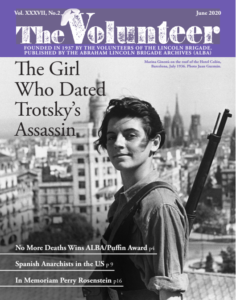Letters to the Editor
Thank you for that amazing story about that amazing photo of an amazing woman: Marina Ginestà, whose life is the stuff of legend. As it happened, I recently visited Spain, where I picked up a magazine with that photo on the cover—but it had no description of who she was. I was grateful that your article filled in the blank. But I was disappointed that you chose as your main cover line “The Girl Who Dated Trotsky’s Assassin.” Really? The cover line trivializes her, reducing her significance to a mere footnote in somebody else’s life. She is history, but your cover line looks right past it. More appropriate might have been “The Woman Who Became a Symbol of the Fight Against Fascism.” And yes—a woman, not a girl. Read your own article: by 17, she was a reporter, an activist, and a high-level interpreter for the Republic.
Bill Kransdorf
To the Editors:
I truly appreciated the cover photo and the article about Ginestà. But the headline was badly conceived and disturbingly backwards. In only 6 words, the title managed to convey absolute sexism—referring to a young woman as a girl and positing her worth only as a “date” for some famous (or infamous) male. Perhaps it accurately portrays the misogyny of the “old left,” but there is no reason to keep that alive as part of the legacy of internationalism. Nor is there any reason to use the non-judgmental term “assassin” instead of “murderer” for Trotsky’s killer. Again, intolerance, authoritarianism, and the lack of accountability are not positive aspects of the legacy of internationalism.
Todd Jailer
To the Editors:
I want to protest the tendency towards knee-jerk, ignorant anticommunism–in this case, anti-Stalinism–in The Volunteer. In the following passage in an otherwise excellent article “The Girl Who Dated Trotsky’s Assassin” in The Volunteer, June 2020, the author, Yvonne Scholten, writes:
… Marina makes an appearance in the diary of Michael Koltsov, the well-known Soviet correspondent who covered the war for Pravda and who was considered one of Stalin‘s confidants. In his Diary of the Spanish Civil War, which was published in Spanish long after Stalin had had his friend liquidated … (p. 12)
I have researched and written about Soviet history of the Stalin period for many years. I possess a copy of Kol’tsov’s investigation file. In it, Kol’tsov confessed to having been recruited by Karl Radek to spy for Germany and France, along with other serious charges. Kol’tsov was named by many others, including Nikolai Yezhov who, as head of the NKVD, carried out an enormous number of illegal executions. Kol’tsov was tried and executed at the same time as was Yezhov and a number of his collaborators. It is a basic principle that defendants should be judged according to evidence, not speculation.
We may wonder: “Maybe Kol’tsov was tortured, or otherwise forcibly induced to confess to crimes of which he was not guilty?” But we have no evidence of this. In Kol’tsov’s case, we only have evidence of guilt. The Soviet Union provided enormous aid to the Spanish Republic, far beyond the value of the payment it received. The Soviet Communist Party organized the International Brigades. None of this could have happened without Joseph Stalin‘s strong support.
At the very minimum, articles that contain anti-Soviet or anti-Stalin statements should be vetted for evidence to support those statements. If evidence is lacking, such statements ought not to be printed in The Volunteer.
Grover Furr
Montclair State University













